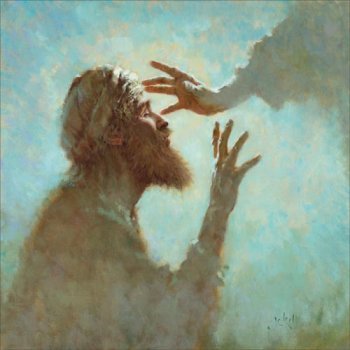Today we are going to continue to take the roads less
traveled by Jesus on the way to Calvary and beyond as we prepare for Easter.
Last week we took a stroll down Zaccheus’ street, an ignored boulevard by all
who knew Him, and discovered that Jesus’ purpose for coming to the world in the
first place was to seek and to save the lost (yes, even people like Zaccheus).
The unmerited grace Zaccheus was given also set Jesus apart from every other
deity. While all other deities require works for rescuing, we learned that
Jesus gives undeserved graces.
However, today we going to take on the next leg in Jesus’
journey in Mark 10:46-52. Here, we pick up where Luke 19:1-10 left off and find
ourselves on what I am going to affectionately call “miracle way.” Some
roadways afford opportunities to encounter amazing spectacles that require
people to stop, get out, and take a look. This would be no different. Therefore, without further ado, let us
investigate 3 interactions that take place as Jesus heads out of Jericho on his
way to Jerusalem from Mark 10:46-52.

I. INTERACTION #1:
Between the Blind man and the Crowd-10:46-48
In light of what happened in Luke 19:1-10, it might be
inferred that the current episode followed shortly after Jesus lodged at
Zaccheus’ house. He is still on His way to Jerusalem to celebrate the Passover
feast and was somewhere in Jericho (some 13 or so miles northeast of
Jerusalem). It is appropriate to also mention that Jesus is at the end of His
ministry, doing His best to cram all that He can before Calvary.
So far, this unbridled determination has led Him on
Zaccheus’ street to a tax collector’s estate. Jesus has already made quite a
name for Himself in these final ministry moments and what will happen next
would be more of the same.
Jesus is now on His final leg in the pilgrimage He is taking
to Jerusalem. He is joined by a massive crowd of people. Some, to be sure, are
simply curious about this man who had dined with someone they all hated. Others
were simply on their way to Jerusalem to worship during the Passover. All, both
Jesus and these followers, were Jewish worshippers heading toward a beloved
celebration.
This would not be unlike everyone heading to their
respective places of worship on the biggest day of worship every year. Although
I wish I was talking about Easter or Christmas, I’m referring to the Superbowl.
Everyone who is anyone dresses up and meets with friends to participate in the
festivities. For some it is about the game, for others it is about meeting with
friends.
However, someone is being left out of the revelry and
celebration, a blind beggar named Bartimaeus “a blind beggar named Bartimaeus,
the son of Timaeus, was sitting by the road” (10:46c). As a blind man, he was
not only physically handicapped and financially impoverished, but he also would
have been excluded from participation in the temple worship. This pitiful
plight is extenuated by his posture—he is sitting by the road. While everyone
else is heading to the party, Bartimaeus is stuck on several different
levels—he is physically stuck in his current sitting position, he is stuck in a
social position far beneath what was admired or acceptable (he is a beggar),
and he is stuck in a ceremonially unclean state (he is blind).
Though blind and immobile, Bartimaeus has not lost his
voice, “when he heard that it was Jesus the Nazarene, he began to cry out and
say, ‘Jesus, Son of David, have mercy on me!’” No doubt as the crowd approached
this man and passed him, he investigated the source of the following that he could
hear was in large supply. Depending on his auditory senses, Bartimaeus eventually
discovers who had created this stir and drawn so many people; it was Jesus!
Though he had never seen Him up to this point in his life, Bartimaeus no doubt
had heard about Him, both positively and negatively. Stories of miracles and
trips to Zaccheus’ home were probably widespread in this region. This gave
Bartimaeus reason for hope. If Jesus could heal others, surely he could heal
him! If Jesus entertained outcasts, surely he would pay attention to his need!
With this hope in view, Bartimaeus literally screams out to
Jesus “Jesus, Son of David, have mercy on me!”(10:47b). By implementing a title
used no here else in Mark, Bartimaeus recognizes Jesus’ royal authority as the
promised king from the line of David. It is clear, that at least on some level,
Bartimaeus recognizes that Jesus is special and is eliciting Him for help.
However, in his desperate attempt for healing, Bartimaeus
seems to have offended some in the crowd, “men were sternly telling him to be
quiet” (10:48a). This blind beggar is obviously cramping the style of some of
the Jewish pilgrims who would have preferred to have their journey to Jerusalem
uninterrupted by such loud screams, especially when they came from someone who
did not have a lot going on.
I often get the same sentiment from my wife, “hush, you are
creating a scene!”
However, Bartimaeus is undeterred by the crowd’s attempts to
silence him and keeps on screaming, “but he kept crying out all the more”
(10:48b)(the idea here is “much more”). This time the verb is imperfect,
suggesting that his screams were ongoing and would continue until they were
answered.
It is obvious that this interaction is not going too well. A
blind beggar is stuck in a crowd of people, who could care less about his
condition, his needs, and his concerns. Things would get nowhere unless someone
intervened.
II. INTERACTION #2:
Between Jesus and the Crowd-10:49-50
Between Bartimaeus’ screams and the crowd’s shushing, Jesus
does what He can to catch everyone’s attention, He stops, “Jesus stopped and
said, ‘Call him here’”(10:49a). It would appear that Bartimaeus’s hopes came
true and his efforts paid off! Jesus had stopped for Him!
However, readers are not immediately made aware of how Bartimaeus
responded. Instead, the crowd is mentioned first, “so they called the blind
man, saying to him, ‘Take courage, stand up! He is calling for you’” (10:49b).
This was a different song than was sung by the crowd before. We must have
misinterpreted things before. The crowd cared all along about this poor man and
was just looking for the right opportunity to help…right?...WRONG! This switch
from scolding to service does not suggest benevolence, but duplicity. This
crowd was following Jesus for the optics, not out of love for God and others.
Though they thought this man was not worth helping before when it appeared to
be an inconvenience, now they were happily willing to go along with Jesus’
request because Jesus had stopped and given His own attention to it. What were
they going to do, stand there and do nothing? Proceed to Jerusalem without this
celebrity? Of course not!
Such duplicity in this story is not unlike the religious
duplicity witnessed in many churches. Rather than willingly helping others all
of the time, we wait until a big event is taking place, service project is
announced, or time is set aside. However, for the most part, the optics are not
in keeping with our personal agendas to really lend a helping hand, especially
to those who request it by screaming or by any other social unacceptable way.
Once called by Christ, the man leaps to his feet and takes as
much of a b-line path to Jesus as a blind man could, “throwing aside his cloak,
he jumped up and came to Jesus” (10:50). Once shown the grace of Jesus’
presence and attention, this man is no longer stuck as he once was. In fact, so
excited by Jesus’ grace is Bartimaeus that he throws aside his cloak, perhaps
his only worldly possession and the very thing he used to collect alms from
passers-by. It is clear that by this time,
things are looking up for Bartimaeus (that is once Jesus intervened on his
behalf by speaking to the crowd).
III. INTERACTION #3:
Between Jesus and the Blind Man-10:51-52
After making his way to the Messiah, Jesus engages
Bartimaeus himself by asking, “what do you want Me to do for you?”(10:51a).
Jesus probably asked this question for several different reasons. However, more
than any other reason, Jesus probably wanted Bartimaeus to articulate his
faith. It is one thing to wish for something in your heart. It is something
different to actually ask for it if given the opportunity, believing that it
will actually happen. Another reason why
Jesus asks Bartimaeus this question in this way is to demonstrate that He alone
could give Bartimaeus what he wanted. This is why he says, “what do you want Me to do for you?” instead of “”what do you want?”
Similarly, it is one thing to desire eternal life on the
inside and another thing entirely to ask for it out loud. Also, it is one thing
to look for eternal life and another thing entirely to discover that only Jesus
Christ can provide it.
Bartimaeus replies “Rabboni, I want to regain my sight!”
(10:51b). This gentle and faithfull request
demonstrates incredible reverence for the Lord Jesus. “Rabboni” means, “my dear
Rabbi.” This blind beggar dares to ask for his sight back! This is nothing
short of a statement of true faith in Jesus’ healing power. How do I know?
Jesus says as much in verse 52.
”Go, your faith has made you well” (10:52a). Jesus awards
faith with healing. However, this blind man’s healing went well beyond
regaining one of his senses. By restoring his sight, Jesus restored this man’s entire
life. No longer would he have to beg. No longer would he be stuck requiring
constant assistance. No longer would he be deemed ceremonially unclean. In
giving this man sight, Jesus gave this man life.
In so doing, Jesus alludes to his fast-approaching work on
the cross. On the cross, Jesus stopped, called the world’s sin to Himself, and
provided life in its place. No longer would people have to beg for life in a
million places. No longer would people be stuck in their sin. No longer would
they be objects of God’s wrath in their unrighteousness. In dying on the cross,
Jesus provided life for all who believe in Him. However, the story is not over
and the end of this road has not been reached.
What would Bartimaeus decide to do with his new life? “Immediately
he regained his sight and began following Him on the road” (10:52b). In
response to the grace given to him, Bartimaeus “began following Him” (10:52).
No longer stuck, Bartimaeus directs the remainder of his journey toward Christ.
Though it is not certain how he lived the rest of his life, Bartimaeus initial
response to the grace of God is discipleship. Subtly, the text seems to make
this case.
As Jesus is heading to his death, so Jesus’ disciples (i.e.
those who have been given eternal life) are called to hand over their lives and
follow Him.
Luke 9:53-“And
He was saying to them all, “If anyone wishes to come after Me, he must deny himself, and take up
his cross daily and follow Me.”
So What?
If Zaccheus’ Street in Luke 19:1-10 taught that Jesus came
to seek and to save the lost, “Miracle Way” in Mark 10:46-52 has taught by
means of these three interactions that Jesus alone can provide the life for
which people so desperately long. And boy to people desperately long for life.
Though they may not scream for it as obviously as Bartimaeus does here, they
are asking for it in the way that they live, highs they seek, success they
crave, money they spend, etc. Though they may not be stuck in physical
blindness, they are stuck in spiritual blindness, caught in a holding pattern
that leads nowhere. If that is you today, heed the words of Romans 10:13-“Everyone
who calls on the name of the Lord shall be saved.”
However, if you already following Jesus today (i.e. you are
part of the crowd) the encouragement today is to take a long look at how you
treat those you are passing along the way. Are you following Jesus for the
optics, having to be solicited for help, sent on a guilt trip by a pastor to
serve, or shushing those who are in need? If so, you are not following Jesus at
all, it just looks like you are. Jesus should never have to ask us to bring
people to Him.
Hitting your head: Disciples, i.e. those who pattern their
lives after Christ and are bent on growing His Kingdom, follow Christ in all
things because they appreciate how much grace they have been given.
Hitting your heart: A heart that breaks for those who are
stuck is a heart after God’s own.
Hitting your walk: Never substitute the selfless service of
others for the optics of religiosity.


